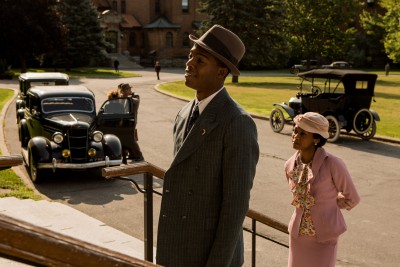
“Race” feels like the sort of film you would watch with your substitute history teacher. It’s just historically relevant enough, isn’t too controversial and has a good set of morals. It sits in a strange void of low-budget, true-story movies like “Thirteen Days” or “A League of Their Own” that usually have one or two familiar names to help sell tickets. “Race” toes a very strange line between straight-to-DVD and Oscar prestige in terms of its quality, but it’s probably closer to the former.
The film tells the true story of track and field legend Jesse Owens (Stephan James) as he goes onto compete in the 1936 Olympics in Berlin, which was controlled by Nazi Germany at the time. “Race” is actually a clever double entendre. The film is a sports movie at its core, but it deals with themes of race relations and loyalty as well.
This film is an oddity. Typically, a historical biopic with themes of race relations sounds like something you think would come out around Oscar season. Yet “Race” is coming out in a relatively dead time of year. Most studios release films they don’t know what to do with immediately after the New Year, but now I can see why “Race” was released when it was. It’s not the worst movie you could see right now, but it also doesn’t surprise in any way. It met all of my mediocre expectations.
It feels almost unfair to criticize a film for issues stemming directly from its low budget, but flaws are flaws. The film’s budget issues become apparent in its use of entirely digital establishing shots. The camera will pan overhead and give a bird’s-eye view of the location it’s transitioning into, except everything shown is computer-generated. The quality of the effects is noticeably bad. Even worse, they use digital effects to fill in the stands of the Berlin stadium, which is reminiscent of the early FIFA video games.
“Race” is a simple story, but unfortunately, this allows it to fall into some trappings. Some characters and their motivations are paper thin. Jesse is often motivated by his girlfriend, and eventual wife, Ruth Solomon (Shanice Banton). This is understandable, except for the fact that her character is not fleshed out at all for the first half of the film. In fact, she has little to no lines until the second or third act.
As a result, the audience doesn’t care about what is probably the most important relationship in Jesse’s life. So when more sentimental scenes transpire, it comes off as forced and cheesy. Unfortunately, this aspect of the film gets worse before it gets better.
“Race” stumbles over some forced melodrama centered on Jesse’s infidelity. He gets a new girlfriend while he’s away, it doesn’t work out and he goes back to Ruth. The entire thing is inconsequential and would have been better off on the cutting room floor.
Eventually, his wife and his family are better fleshed out. The romantic relationship between Jesse and Ruth is heartwarming. Meanwhile, Jesse’s family also gets some added screen time before the final act of the film. This increased emotional investment really pays off in the film’s most climactic moments during the Berlin games.
James does an excellent job of encapsulating all of Owens’ mannerisms. It’s clear that James is dedicated to this role, going even as far as doing most of the actual running in the film.
Jesse’s coach, Larry Snyder, is played by Jason Sudeikis. This is unusual ground for Sudeikis, as he is heavily involved in comedies. In his first major dramatic outing, he does a fine job.
Sudeikis plays a man who is a “non-racist” of sorts. Coach Snyder purely cares about whether or not Jesse can win and is, in a sense, colorblind. While that is somewhat admirable, Snyder is also blind to the struggles and pressures put upon Jesse and the African-American community as a whole.
When those struggles potentially get in the way of success, it creates for some excellent dramatic moments. Sudeikis can’t quite deliver in the emotionally intense scenes, but his chemistry with James more than makes up for it.
The film’s greatest strength is its depiction of the Olympic events themselves. They are built up to with a great level of suspense and tension, then delivered with a combination of dynamic camerawork coupled with a riveting score, creating some exhilarating yet unfortunately short-lived sequences.
The final event is actually the least climactic of them all, with almost no buildup or excitement put into making this scene last. There’s no moment to relish the victory. With almost no suspense placed on the few precious milliseconds required for Jesse to break the world record, “Race” seems to move right along without a second thought about what should have been its most electrifying scene.
“Race” is reminiscent of “42,” another sports film with themes of race relations. Ultimately, they are both feel-good movies that deal with a victim of prejudice overcoming the odds set before them. They aren’t the most graceful or subtle when it comes to delivering their themes and messages, but they’re still admirable attempts. “Race” does not exceed anyone’s expectations, but at least it serves as a reminder of a great figure in history.
























































































































